
“ויקהל משה את כל עדת בני ישראל ויאמר אליהם אלה הדברים אשר דבר ה’ לעשות אתם” (ל”ה,א’)
The ילקוט says that this Parsha, which starts off with hilchos Shabbos, is the only Parsha that begins with ויקהל. Hashem told Moshe to gather groups together and teach them hilchos Shabbos, so that all future generations will learn from you to gather together every Shabbos in the בתי מדרש and learn divrei Torah of איסור והיתר. Through doing so Hashem’s name will be praised.[1]
The בד קודש asks why at first the ילקוט says you should teach them hilchos Shabbos, and then at the end it says they should gather together and learn איסור והיתר which includes all halachos not only hilchos Shabbos?
He explains that coming together to learn on Shabbos is itself a halacha of Shabbos. Hashem told Moshe to tell Klal Yisroel that coming together to learn on Shabbos is מהלכות שבת. Since the Torah was given on Shabbos, the השפעה of מעמד הר סיני is מתעוררת every Shabbos. That is why everyone should gather together to learn just like by מעמד הר סיני. By doing so, one will also be מקושר ליום השבת. One who teaches Torah in public on Shabbos, besides for being מקיים the mitzvah of תלמוד תורה ברבים he is also beingמקיים the דין שבת of learning Torah ברבים . This may very well be the שורש ומקור to speak between קבלת שבת and מעריב.
The Passuk in ישעיה says “וקראת לשבת עונג” The אבן עזרא explains .שתתענג הנפש בשמוע דברי תורה – The נפש will rejoice when it hears words of Torah. The Rema in Hilchos Shabbos (סימן רצ”א סעיף א’) says that if one is accustomed to take an afternoon nap he should also do so on Shabbos because it is עונג שבת. The Mishnah Berura however says that he should not nap too long so as not to cause ביטול תורה. Even though תלמידי חכמים have more of a mitzvah of עונג on Shabbos since they learn the whole week (רמ”א שם סעיף ב’), it does not mean they can waste their whole day with תענוגים. Rather they can extend their תענוג more than others.
The Mishnah Berura then quotes the Zohar who says that it is a מצוה to be מחדש חידושים on Shabbos. If one is unable to do so he should learn something that he has not yet learned and that will be considered as if he was מחדש.
In the סידור יעב”ץ it is written that one should not bother himself with in depth learning on Shabbos. Learning on Shabbos has to be a תענוג and not a burden. How do we reconcile this with the words of the Zohar that one has to be מחדש חידושים on Shabbos? The Zohar says that when the נשמה יתירה returns to its place after Shabbos הקב”ה asks what it was מחדש.
The Meforshim explain that of course one has to exert himself in learning even on Shabbos, but one has to make sure that it is done only בדרך תענוג. Some say that the main thing is when the חידוש was spoken out. Even if he wrote it out before Shabbos and spoke it out on Shabbos, it is considered as if he was מחדש it on Shabbos.
“חפציך בו אסורים וגם לחשוב חשבונות הרהורים מותרים ולשדך הבנות ותינוק ללמדי ספר למנצח בנגינות ולהגות באמרי שפר בכל פנות ומחנות”. We say in the zemiros “ולהגות באמרי שפר” one should learn אמרי שפר on Shabbos. Why does the פייט put this together with the other things that have reason to be אסור because of חפציך בו אסורים. Why should “להגות באמרי שפר” be אסור? The answer is because it is a contradiction to עונג שבת. However, if one learns in a way that he is being משפר the Torah, that brings a תענוג and for this reason it is מותר.
During the week if one has to make פרנסה he has a פטור from לימוד התורה. The פלא יועץ however says that someone who wastes his time on Shabbos and Yom Tov and does not learn, will also be punished for not learning during the week. The excuse that he was busy making פרנסה won’t stand. Shabbos will be used as a proof against him, that he was not busy with פרנסה and he still did not learn.
The יסוד ושורש העבודה writes that if on Shabbos one thinks of a הנהגה טובה that he will practice during the week that is also considered לימוד התורה.[2]
Prepared by R’ Avrohom Yehoshua Ziskind
[1] וז”ל הילקוט “רבותינו בעלי אגדה אומרים מתחלת התורה ועד סופה אין בה פרשה שנאמר בראשה ויקהל אלא זאת בלבד, אמר הקב”ה עשה לך קהלות גדולות ודרוש לפניהם ברבים הלכות שבת כדי שילמדו ממך דורות הבאים להקהיל קהלות בכל שבת ושבת ולכנוס בבתי מדרשות ללמד ולהורות לישראל דברי תורה איסור והיתר כדי שיהא שמי הגדול מתקלס בין בני וכו'” עכ”ל.
Sources[2] בד קודש, משנה ברורה,ובתורתו יהגה,פסקים ותשובות,פסקי תשובות
[1] וז”ל הילקוט “רבותינו בעלי אגדה אומרים מתחלת התורה ועד סופה אין בה פרשה שנאמר בראשה ויקהל אלא זאת בלבד, אמר הקב”ה עשה לך קהלות גדולות ודרוש לפניהם ברבים הלכות שבת כדי שילמדו ממך דורות הבאים להקהיל קהלות בכל שבת ושבת ולכנוס בבתי מדרשות ללמד ולהורות לישראל דברי תורה איסור והיתר כדי שיהא שמי הגדול מתקלס בין בני וכו'” עכ”ל.
Sources[1] בד קודש, משנה ברורה,ובתורתו יהגה,פסקים ותשובות,פסקי תשובות